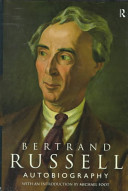A Liberal Decalogue
Perhaps the essence of the Liberal outlook could be summed up in a new decalogue, not intended to replace the old one but only to supplement it.
The Ten Commandments that, as a teacher, I should wish to promulgate, might be set forth as follows:
|
1.
|
Do not feel absolutely certain of anything.
|
|
2.
|
Do not think it worth while to proceed by concealing evidence, for the evidence is sure to come to light.
|
|
3.
|
Never try to discourage thinking for you are sure to succeed.
|
|
4.
|
When you meet with opposition, even if it should be from your husband or your children, endeavour to overcome it by argument and not by authority, for a victory dependent upon authority is unreal and illusory.
|
|
5.
|
Have no respect for the authority of others, for there are always contrary authorities to be found.
|
|
6.
|
Do not use power to suppress opinions you think pernicious, for if you do the opinions will suppress you.
|
|
7.
|
Do not fear to be eccentric in opinion, for every opinion now accepted was once eccentric.
|
|
8.
|
Find more pleasure in intelligent dissent that in passive agreement, for, if you value intelligence as you should, the former implies a deeper agreement than the latter.
|
|
9.
|
Be scrupulously truthful, even if the truth is inconvenient, for it is more inconvenient when you try to conceal it.
|
|
10.
|
Do not feel envious of the happiness of those who live in a fool's paradise, for only a fool will think that it is happiness.
|
Notes:
Bertrand Russel's 10 rules to live by for those who love truth and knowledge.
Folksonomies: philosophy virtue
Taxonomies:
/law, govt and politics (0.744723)
/health and fitness/disorders/mental disorder/panic and anxiety (0.447278)
/society/unrest and war (0.378543)
Keywords:
Decalogue Bertrand Russel (0.950795 (positive:0.364441)), new decalogue (0.760114 (neutral:0.000000)), Liberal outlook (0.722546 (neutral:0.000000)), contrary authorities (0.700720 (negative:-0.278042)), intelligent dissent (0.677944 (neutral:0.000000)), deeper agreement (0.674485 (neutral:0.000000)), passive agreement (0.673221 (neutral:0.000000)), authority (0.607528 (negative:-0.426806)), truth (0.548285 (positive:0.059954)), fool (0.529998 (positive:0.382204)), evidence (0.527472 (neutral:0.000000)), happiness (0.525474 (positive:0.382204)), opinion (0.520662 (negative:-0.483547)), opinions (0.508199 (negative:-0.599717)), Commandments (0.479484 (negative:-0.318316)), essence (0.474978 (neutral:0.000000)), opposition (0.468733 (neutral:0.000000)), rules (0.467765 (positive:0.364441)), knowledge (0.467533 (positive:0.364441)), teacher (0.466372 (neutral:0.000000)), argument (0.466070 (negative:-0.441406)), husband (0.464545 (neutral:0.000000)), respect (0.463668 (negative:-0.325139)), light (0.462855 (neutral:0.000000)), victory (0.462245 (negative:-0.513875)), children (0.459040 (neutral:0.000000)), power (0.458719 (negative:-0.661651))
Entities:
Bertrand Russel:Person (0.758306 (positive:0.364441))
Concepts:
Epistemology (0.952691): dbpedia | freebase | opencyc
Critical thinking (0.842385): dbpedia | freebase | opencyc | yago
Logic (0.760179): dbpedia | freebase | opencyc
Bertrand Russell (0.700927): dbpedia | freebase | opencyc | yago
Truth (0.695728): dbpedia | freebase
Political philosophy (0.690909): dbpedia | freebase | opencyc
Belief (0.673801): dbpedia | freebase
Ten Commandments (0.623644): dbpedia | freebase | opencyc | yago






